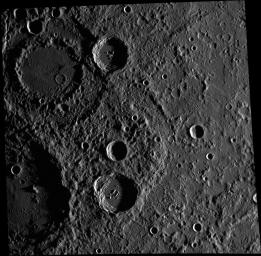This image shows an excellent example of an unnamed peak ring crater in the top left corner. This view also includes two named craters: Futabatei and Sullivan. Futabatei, named for the Japanese author, translator, and literary critic, is the crater with central peaks in the bottom half of the image. To its left lies Sullivan, named for Louis Henri Sullivan, who was a highly regarded American architect and is praised as the "father of skyscrapers." In this scene, only the right half of Sullivan is visible, and much of it is in shadow.
This image was acquired as part of MDIS's high-resolution stereo imaging campaign. Images from the stereo imaging campaign are used in combination with the surface morphology base map or the albedo base map to create high-resolution stereo views of Mercury's surface, with an average resolution of 200 meters/pixel. Viewing the surface under the same Sun illumination conditions but from two or more viewing angles enables information about the small-scale topography of Mercury's surface to be obtained.
Date acquired: March 03, 2012
Image Mission Elapsed Time (MET): 239248990
Image ID: 1467982
Instrument: Wide Angle Camera (WAC) of the Mercury Dual Imaging System (MDIS)
WAC filter: 7 (748 nanometers)
Center Latitude: -13.96°
Center Longitude: 276.8° E
Resolution: 327 meters/pixel
Scale: This image is 339.3 km (210.8 miles) across.
Incidence Angle: 83.7°
Emission Angle: 12.4°
Phase Angle: 91.9°
The MESSENGER spacecraft is the first ever to orbit the planet Mercury, and the spacecraft's seven scientific instruments and radio science investigation are unraveling the history and evolution of the Solar System's innermost planet. Visit the Why Mercury? section of this website to learn more about the key science questions that the MESSENGER mission is addressing. During the one-year primary mission, MDIS acquired 88,746 images and extensive other data sets. MESSENGER is now in a year-long extended mission, during which plans call for the acquisition of more than 80,000 additional images to support MESSENGER's science goals.
These images are from MESSENGER, a NASA Discovery mission to conduct the first orbital study of the innermost planet, Mercury. For information regarding the use of images, see the MESSENGER image use policy.

 Planetary Data System
Planetary Data System












